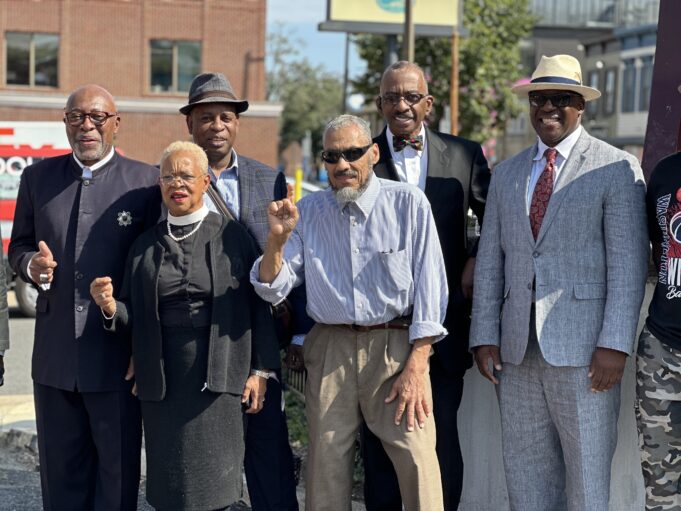WASHINGTON, D.C.—Faith leaders gathered recently in the city’s poorest community for a news conference to discuss the rising crime. It was a rare but necessary coming together to address a problem that fails to discriminate based on religion. As of September 21, violent crimes in D.C. are up 37 percent from this same time period last year. That translates to more than 1,000 more violent crimes (homicides, sex abuse, robbery and assault with a dangerous weapon) than this time last year.
“It is no coincidence that we should be gathered here on Martin Luther King Jr. Avenue to assemble as clergy concerned over gun violence and the number of homicides in our community, especially here in Ward 8 where killings have increased by 100 percent in one year,” said Archbishop George Augustus Stallings Jr.
There could have been lots of finger-pointing and questions asked. Whose fault is it? What is the mayor doing? What are the police doing? Where are their parents? What about the city council? Instead, this group of clergy accepted the responsibility as people of faith that they could do more and use faith-based solutions to solve the crime problems.
“We cannot legislate away the guns in our community,” said Senior Pastor E. Gail Anderson Holness, of Adams Inspirational AME Church. “We cannot pray them away.”
“As clergy stands here, together, we know and understand that faith without work is dead, and we’ve come to do the work,” Pastor Holness explained. “We may have suits on, we may have collars on, we’ve come to take the collars off, the suits off, put on some sweats, and be out here with our young people.”
On any given day in Ward 8, residents hear gunshots. Crime data shows that violent crime spikes at two specific times of the day in that community, including when children are coming home from school. The numbers show that violent crime occurs most frequently during the 4 p.m. hour and again between the hours of 8:00 and 11:00 p.m. A violent crime heat map presented at Mayor Muriel Bowser’s spring crime summit showed no safe spaces in the immediate hours after school.
Abdul Khadir Muhammad, Nation of Islam Mid-Atlantic Student Regional Minister, spoke at the news conference. He told The Final Call that the answer is in the streets.
“At least once or twice a week we have to go into some of the rough neighborhoods. The oldest spots we used to go two years ago, and at they’re out there, deal with them, sit down with them, and then talk. We have to dress down. If we come with suits on and neckties they will think we are somebody else. That’s going to take being committed to at least twice a week and work with leadership in those communities. We want to lead the brothers back into the community to show love to our brothers and to the sisters.”
The Nation of Islam has a history of cleaning up neighborhoods from drugs and crime. In 1988, the Dopebusters were legendary in transforming communities. At its height, N.O.I. security serviced about 30 sites nationwide. In addition, the employee roster grew from 25 employees to more than 300.
Crisis Management is a similar company with contracts in D.C. started by Nation of Islam member Dyrell Muhammad. He spoke at the news conference. “The plan of action starts from jobs, and more jobs, housing, mental health, and addressing drug addiction. That’s the key. When you ask people to do or stop doing certain things, you have to replace it with something of substance,” he told The Final Call.
“Right now, we’re not providing the substances they need, even though there’s a lot of resources here. I’m ready to crisscross Washington, D.C., and ask these developers, because you’re building in our city, to give back to the community. That’s the plan. Practical application.”
Dyrell Muhammad is planning a youth-centered community-wide gathering on October 14. His plan is to have youth speak from various high schools and have them share what they think the solutions are to rising crime. The faith leaders will also be involved.
Tyrone Parker has walked the streets of D.C. for decades working to stem violence. He recently retired from the Alliance of Concerned Black Men. “I think the challenge for us is the spiritual aspect of God. Our being involved with the people and the people knowing to love each other and caring about one another.
We, as a community, have not come together to be able to demonstrate to the youth the love and concern that we have for them,” he told The Final Call. “We have not gone into the community where they are and given them the love and concern that they need. We must be there to help, to direct them, to give them hope, to give them opportunity, to show them that they can do more than what they have done,” Mr. Parker added.
“I retired after 30 years, but I do not know what retirement looks like. I continue to be on the frontline, boots on the ground. Consistently, in spite of what we had, resources or didn’t have, resources, we were there. Now we see the kids that we worked with over the years that made a transformation. We have to come together as a community and blow the horn. Upon them blowing the horn and beating the drums, you watch what happens.”













